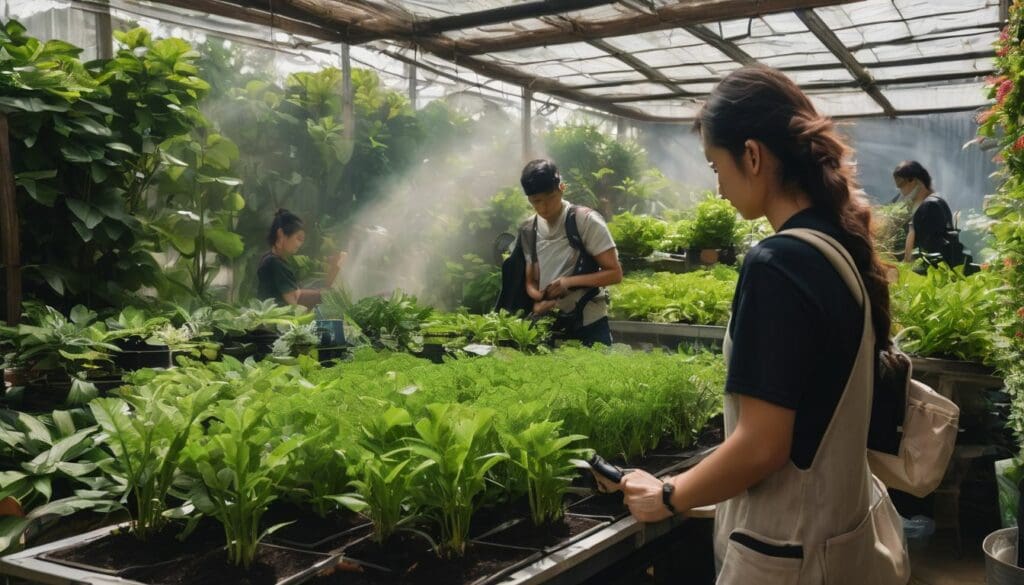Have you ever wondered how to keep your garden thriving without harming the planet? Each year, gardens require tonnes of fertilisers, but not all are good for our Earth. This guide will show you how to choose sustainable fertilisers that nourish your plants and respect the environment.
Let’s grow green together!
Key Takeaways
- Organic mineral fertilisers enhance soil health and are eco – friendly, making them a top choice for sustainable gardening.
- Regular soil testing is essential to determine the right balance of nutrients needed and to select the most appropriate fertiliser for your garden.
- Using organic options such as compost, manure, or naturally derived products helps improve soil structure and supports environmental conservation efforts.
- It’s important to apply fertilisers correctly by following label instructions and considering each plant’s specific needs for balanced growth without harming ecosystems.
- Alternating between different types of organic mineral fertilisers can provide diverse nutrients, promoting overall plant health and sustainable garden practices.
Importance of Fertilising Plants
Fertilising plants is important for ensuring they receive the necessary nutrients for healthy growth. Understanding soil texture and choosing the right fertiliser are essential factors in maintaining plant health.
Nutrient availability in soils
Soil health hinges on the balance and presence of essential nutrients that plants need to thrive. These include nitrogen, phosphorus, and potassium, commonly referred to as N-P-K on fertiliser labels, along with a suite of micronutrients like calcium and magnesium.
Nutrients in the soil are not always readily available for plant uptake due to factors such as pH levels, compaction, and organic matter content. Gardeners should test their soil regularly — this will reveal which nutrients are lacking so they can make informed decisions about supplementation.
Optimising nutrient availability often involves improving soil texture by incorporating organic matter such as compost or leaf mould. This enhances the soil’s structure, water retention capabilities and introduces beneficial microorganisms that play a crucial role in natural fertilisation processes.
Sustainable gardening practices encourage the use of eco-friendly fertilisers that not only nourish plants but also support underlying environmental responsibility by maintaining long-term soil fertility without harmful chemicals.
Understanding soil texture
When considering the nutrient availability in soils, it’s important to understand soil texture. Soil texture refers to the composition of soil particles, including sand, silt, and clay.
Each type of particle has unique properties that affect water retention, aeration, and nutrient-holding capacity. Sandy soil allows water to drain quickly but struggles to retain nutrients, while clay soil retains water well but can become compacted, limiting root growth.
Silt falls between these extremes and offers balanced characteristics.
Choosing the right fertiliser
Selecting the appropriate fertiliser is crucial for promoting healthy plant growth in your garden. Analyse your soil’s nutrient requirements and consider a soil test to identify any deficiencies.
Identify the specific needs of your plants, whether they require nitrogen, phosphorus, or potassium. Look for a balanced fertiliser that contains these essential nutrients in the correct proportions.
Consider using organic fertilisers such as compost or manure to improve soil structure and increase microbial activity. Organic options promote sustainable gardening practices and reduce chemical leaching into the environment.
Types of Fertilisers
When it comes to fertilising your garden, there are two main types of fertilisers: inorganic and organic. Each type has its own benefits and drawbacks, so it’s important to understand which one is best for your specific gardening needs.
Inorganic
Inorganic fertilisers are synthetic and chemically formulated to provide specific nutrients to plants. They are often water-soluble, allowing for quick absorption by plants. Inorganic fertilisers can be a practical choice for gardeners who need to address specific nutrient deficiencies in their soil quickly.
However, overuse of inorganic fertilisers can lead to imbalanced soil pH levels and negatively impact beneficial microorganisms in the soil.
Conventional gardening often relies on synthetic or chemical-based fertilisers, but it’s important for environmentally conscious individuals to understand the potential drawbacks of these products and consider more sustainable alternatives when possible.
Organic
Transitioning from inorganic fertilisers to organic options, environmentally conscious gardeners are increasingly turning to natural alternatives for sustainable gardening. Organic fertilisers offer numerous benefits over synthetic options, promoting soil health and plant nutrition without harmful chemical residues.
With a focus on eco-conscious gardening, organic mineral fertilisers contribute to sustainable agriculture by improving soil quality and supporting responsible fertiliser use.
Organic gardeners can choose from a variety of natural options such as composting, green manures, and naturally derived products that enhance soil health. By prioritising the use of organic materials and minimising reliance on synthetic alternatives, individuals can cultivate healthier gardens while contributing positively to environmental conservation efforts.
How and When to Fertilise Specific Plants
Fertilising vegetables and flowers requires understanding the specific nutrient needs of each type of plant. Different types of fertilisers should be used at different stages of growth to ensure optimal growth and production.
Fertilising vegetables and flowers
To fertilise vegetables and flowers effectively:
- Test the soil to determine its nutrient needs.
- Choose a balanced fertiliser with equal N-P-K ratios for vegetable and flower growth.
- Apply the fertiliser evenly around the plant root zone, avoiding direct contact with stems or leaves.
- Water the plants after fertilising to help nutrients penetrate the soil.
- Monitor plant growth and adjust fertilisation as needed based on visual cues.
Tips for using different types of fertilisers
To get the most benefit from your fertilisers, consider these tips:
- Match the fertiliser to the plant’s needs. Understanding the nutrient requirements of your plants is crucial for choosing the right type of fertiliser.
- Follow application guidelines on the label. It’s important to use the correct amount and apply at the right time to prevent over-fertilisation and potential harm to your plants.
- Use organic fertilisers for slow-release benefits. Organic fertilisers provide a steady supply of nutrients to plants over time, promoting healthy growth without the risk of chemical burn.
- Rotate types of fertilisers for balanced nutrition. Alternating between different types of fertilisers can help maintain a diverse range of nutrients in the soil, benefiting plant health.
- Monitor soil pH levels regularly. Different types of fertilisers can impact soil acidity or alkalinity, so it’s essential to check and adjust pH levels as needed.
Organic Fertilisers for Sustainable Gardening
Explore the benefits of using organic mineral fertilisers for sustainable gardening, including improving soil health and reducing environmental impact. Discover different types of organic fertilisers and how to effectively use them in your garden.
Benefits of organic mineral fertilisers
Organic mineral fertilisers promote soil health by providing essential nutrients in a natural and sustainable manner. These fertilisers enhance the overall fertility of the soil, ensuring long-term plant growth while minimising environmental impact.
They also improve soil structure and water retention, supporting healthy microbial activity for a thriving garden ecosystem.
By using organic mineral fertilisers, gardeners contribute to reducing synthetic chemical usage, thus preserving wildlife and natural habitats. Additionally, these eco-friendly options play a crucial role in promoting balanced plant nutrition without harsh chemicals or artificial additives.
Types of organic mineral fertilisers
Organic mineral fertilisers provide essential nutrients to plants while promoting soil health. They are sustainable and environmentally friendly options for gardeners. When choosing organic mineral fertilisers, consider these types:
- Rock Phosphate: Contains phosphorus and other trace minerals beneficial for plant growth. It is slow-release and improves soil structure over time.
- Kelp Meal: High in potassium, kelp meal enhances plant tolerance to stress and promotes healthy root systems. It also contains micronutrients vital for overall plant health.
- Bone Meal: Rich in phosphorus and calcium, bone meal is ideal for flowering plants and fruits as it supports strong root development and abundant blooms.
- Fish Emulsion: A quick-release source of nitrogen, fish emulsion also provides essential amino acids that promote vigorous growth and green foliage.
- Wood Ash: Acts as a natural source of potassium and raises soil pH levels, benefiting fruiting plants such as tomatoes and peppers.
- Seaweed Extract: Packed with micronutrients, seaweed extract stimulates plant growth, improves disease resistance, and enhances overall plant vitality.
How to use organic mineral fertilisers
To use organic mineral fertilisers, follow these steps:
- Understand the nutritional needs of your plants and choose a fertiliser with the right balance of nutrients.
- Follow the recommended application rates provided on the fertiliser packaging to avoid over-fertilising.
- Apply the organic mineral fertiliser evenly around the base of the plant, ensuring that it does not come into direct contact with the plant’s stems or leaves.
- Water the plants after applying the organic mineral fertiliser to help it reach the roots and begin nourishing the plant.
- Consider using organic mulch to help retain moisture and improve soil structure while supporting slow release of nutrients from the organic mineral fertiliser.
- Monitor your plants for signs of growth and health, adjusting your fertilising schedule as necessary to ensure optimal results.
Conclusion
Choosing the right fertiliser for your garden is essential for healthy plant growth and sustainable gardening practices. Consider the significance of organic fertilisers for a more environmentally friendly approach to gardening.
To learn more about sustainable garden fertilisers, keep reading!
Choosing the right fertiliser for your garden
Selecting the appropriate fertiliser for your garden is crucial for promoting healthy plant growth. Consider factors such as soil type and the specific nutrient requirements of your plants when choosing a fertiliser.
Conduct a soil test to determine the pH level and existing nutrient levels in your soil, allowing you to select a fertiliser that addresses any deficiencies. Additionally, consider using organic fertilisers, which provide sustainable benefits by improving soil health and supporting environmentally conscious gardening practices.
When selecting a fertiliser for your garden, it’s important to read the labels carefully to understand the nutrient content and application instructions. Look for natural or organic fertilisers that align with ecoconscious gardening goals while effectively nourishing your plants.
Significance of organic fertilisers for sustainable gardening.
Organic fertilisers play a crucial role in sustainable gardening by nourishing plants without harmful chemicals. They promote soil health improvement and contribute to environmental conservation, making them ideal for environmentally conscious individuals.
The use of organic mineral fertilisers reduces reliance on synthetic products, supporting green gardening practices and natural fertilizers.
Choosing the right organic mineral fertiliser for home garden is key to promoting eco-friendly practices that benefit both plants and the environment. Organic fertilisers offer nutrient-rich solutions that support healthy growth without compromising soil quality or contributing to pollution.
FAQs
1. What are sustainable garden fertilisers?
Sustainable garden fertilisers include organic options like homemade plant fertiliser, which help grow your home gardening projects without harming the environment.
2. Can I use inorganic fertilisers for my garden and still be eco-friendly?
While organic fertilisers are typically more eco-friendly, learning to correctly read fertiliser labels can guide you in choosing less harmful synthetic options when necessary.
3. How do I make my own homemade plant fertiliser for home gardening?
You can create a sustainable homemade plant fertiliser using kitchen scraps or compost, providing natural nutrients that support the growth of your plants in your garden.
4. Are there specific methods for fertilising roses sustainably?
Yes, roses thrive with specially created organic fertilisers that provide key nutrients without overloading them with harsh chemicals found in some synthetic products.
5. Why should I choose organic over synthetic fertilisers for my home garden?
Organic fertilisers not only nourish your plants but also improve soil health over time, unlike many synthetic variants that may degrade soil quality and contribute to environmental pollution.





